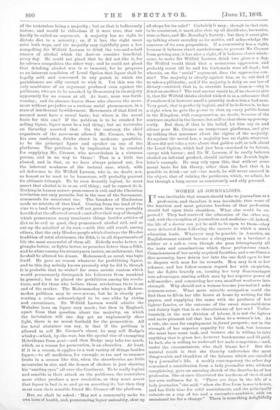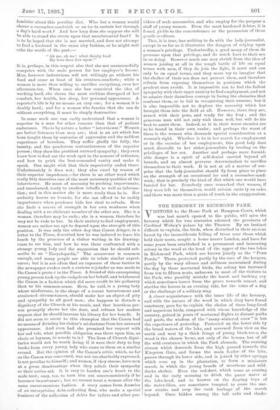WOMEN AS JOURNALISTS.
IT was inevitable that women should take to journalism as a profession, and therefore it was inevitable that some of the heaviest and most grievous burdens of that profession should fall upon their shoulders. What else could he ex- pected P They had received the education of the other sex, and, with the exception of journalism and medicine—if, indeed, the life of a doctor can yet be said to be open to them—they were debarred from following the careers to which a man's education leads. Whatever may be possible in America, an Englishwoman cannot become a clergyman or a barrister, a soldier or a sailor, even though she pass triumphantly all the tests and examinations which those professions exact. Consciousness of her newly acquired faculties, and sometimes a dire necessity, have driven her into the one field open to her to dispute with man for its rewards. Men may look at her askance, and her fellow-women regard her with suspicion, but she fights bravely on, turning her very disadvantages into advantages, ousting selfish man by her superior power of self-sacrifice, and converting her own manifest weakness into strength. Why should not a woman become journalist ? asks common-sense. What more suitable occupation could she find than to fill-in her idle hours at home by writing for the papers, and supplying the same with the products of her lighter fancies, or the outcome of the sweet reasonableness and dainty logic that is so characteristic of her sex P Unfor- tunately, in the new division of labour, it is not the lighter and more pleasant toil that has fallen to a woman's lot. As a rule, she sues for employment inform/ pauperie ; not in the strength of her superior capacity for the task, but because she must have some task, and because she is willing to take anything that is given her, however burdensome and ill-paid. In fact, she is willing to undersell her male competitor,—and, under the circumstances, who shall blame her P But the natural result is that she thereby undertakes the most disagreeable and thankless of the labours which are entailed by a journalist's life. A weekly contemporary the other day contained a contribution from a lady-journalist who, without complaining, gave an amusing sketch of the drawbacks of her profession. She at once illustrated the hardness of the toil and her own unfitness for it. "There are days in the life of a lady-journalist," she said, " when Ow flies from house to house, and has little time for solid nourishment, and she principally subsists on a cup of tea and a caeumber-sandwich, with an occasional ice for a change." There is something delightfully feminine about this peculiar diet. Who but a woman would choose a cucumber-sandwich or an ice to sustain her through a day's hard work P And how long does she suppose she will be able to stand the strain upon that unsubstantial food P It .18 to be hoped that she is not married, and does not attempt to feed a husband in the same airy fashion, or he might well .echo the words of the poet :—
" A.h me, ah me! what dainty food My love does live upon !"
It is, perhaps, in this respect also that she not unsuccessfully competes with the male person for her employer's favour. Man, however industrious, will not willingly go without his food and some at least of his creature-comforts; while a woman is more than willing to sacrifice everything, even her -afternoon-tea. When once she has conceived the idea of working hard, she shows the most reckless disregard of her comfort, her health, her sleep, her personal appearance. A reporter's life is by no means an easy one; for a woman it is doubly hard; and for a woman who fancies that she can do "without everything, it must be simply destructive.
In some work one can easily understand that a woman is superior to a man for other reasons than that of patient endurance. She is by nature a better " interviewer." Women are better listeners than men are ; that is an art which has been taught them by centuries of oppression and the saddest experience of boredom. They suffer gladly the folly, the -inanity, and the ponderous sententiousness of the superior person ; they show the prettiest outward sympathy ; they even know how to find out the weak spot in the armour of reticence, and how to prick the best-concealed vanity and make it speak. One might wish that their superiority ended there. -Unfortunately it does not; they also excel by reason of -their superior impudence,—for there is no other word which really fitly describes one of the most necessary qualities of the interviewer. He must of necessity be pushing. importunate, and unashamed, ready to swallow rebuffs as well as informa- tion; and in this matter she is more ready than he is. Her audacity knows no bounds, for she can afford to be rashly importunate when prudence bids her rival to refrain. Here she finds a source of strength in her own weakness when dealing with a recalcitrant member of the other sex. She is a woman. therefore may be rude ; she is a woman, therefore he may not be rude to her. In their anxiety to find employment, women are rather too apt to depend upon the strength of this position. It was only the other day that Canon Ainger, in a letter to the Times, described bow he was induced to leave his lunch by the presence of a visitor waiting in his drawing- room to see him, and how he was there confronted with a strange young lady and the suggestion that he should sub- scribe to an " Encyclopedia." The occurrence is common enough, and many people are able to relate similar experi- ences; but it is not often that an exposure of these tactics in the newspaper evokes such a curious rejoinder as was made to the Canon's protect in the Times. A friend of this enterprising young person took up the cudgels on her behalf, and belaboured the Canon in a fashion which did more credit to his gallantry than to his common-sense. Here, he said, is a young lady whose misfortune, in the shape of a recent bereavement and straitened circumstances, should make her an object of pity and sympathy to all good men; she happens to disturb a dignitary of the Church at his meals, and that heartless per- son promptly shows her the door, and refuses her modest request that he should increase his library for her benefit. It did not seem to occur to this champion that the Canon had no means of divining his visitor's misfortune from her outward appearance. And even had she premised her request with her sad tale, what possible obligation was there upon him, as cleric or layman, to accede to it ? The lives of Church digni- Aeries would not be worth living if it were their duty to buy books from every young lady who came to them on a similar errand. But the opinion of the Canon's critic, which, as far as the Canon was concerned, was not too charitably expressed, is not peculiar to himself ; and women, if they choose, have men at a great disadvantage when they solicit their sympathy .or their active aid. It is easy to harden one's heart to the male tout; easy, too, to turn him out unceremoniously if he becomes importunate; but we cannot treat a woman after the same unceremonious fashion. A story comes from America of an enterprising debt-collecting firm, who make a special 43usiness of the collection of debts for tailors and other pro-
viders of male necessaries, and who employ for the purpose a staff of young women. Even the most hardened debtor, it is found, yields to the remonstrance or the persuasion of these gentle creditors.
This, it is true, has nothing to do with the lady-journalist, except in so far as it illustrates the dangers of relying upon a woman's privilege. Undoubtedly, a good many of them do presume upon that privilege, and do much hurt to their sex in so doing. However much one may shrink from the idea of women joining at all in the rough battle of life on equal terms with men, if they do join the fight, it must and can only be on equal terms, and they must try to imagine that the shelter of their sex does not protect them, and therefore refrain from exposing themselves in positions which the prudent man avoids. It is impossible not to feel the fullest sympathy with their eager anxiety to find employment, and not to admire their dauntless courage in facing the obstacles that confront them, or to fail in recognising their success; but it is also impossible not to deplore the necessity which has brought them into the field at all. However, there they are, armed with their pens, and ready for the fray ; and the generous man will not only wish them well, but will do his best to assist them. Indeed, as it is, their worst enemies are to be found in their own ranks ; and perhaps the worst of them is the woman who demands special consideration as a woman's right. Whether it be in her search fur employment or in the exercise of her employment, this good lady does much discredit to her sister-journalists by trading on the privileges of her sex. Another and perhaps more formid- able danger is a spirit of self-denial carried beyond all bounds, and an almost perverse determination to sacrifice themselves to their work. It is not at all a matter of sur- prise that the lady-joarnalist should fly from place to place on the strength of an occasional ice and a encumber-sand- wich ; that is precisely the kind of diet which one would have fancied for her. Somebody once remarked that women, if they were left to themselves, would subsist entirely on cake, and there was more than a grain of truth in the exaggeration.



































 Previous page
Previous page